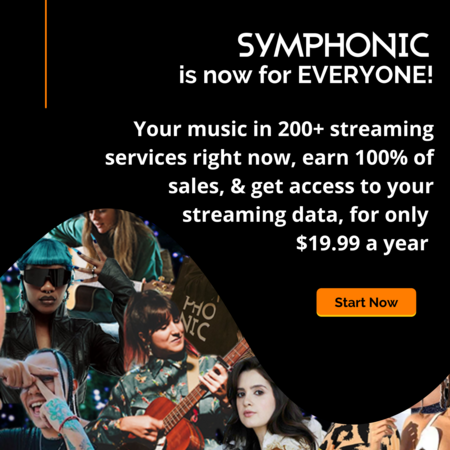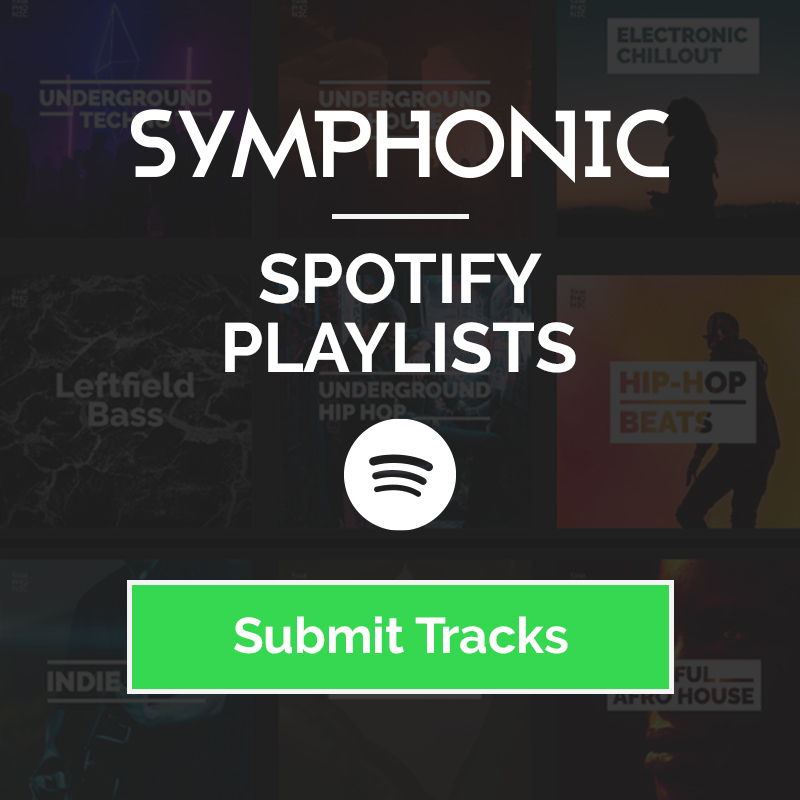
by Francesca | Nov 9, 2023 | Music Industry, Playlists
Back in July, Symphonic Distribution acquired the music industry marketing collective Streaming Promotions. Since then, we’d like to break down exactly what we do and how you can benefit from our services right here. Here’s everything you need to know.
Everything You Need To Know About Streaming Promotions
What is it?
Streaming Promotions is a Marketing Agency that works to push your music organically through relationships. They have connections with over 1500+ playlist curators on Spotify and over 3000 playlists on the platform. They don’t pay for placements or use artificial streams, it’s all based on true human connection.
They start by understanding the client’s sound and focus tracks in a general process – tagging all genres, subgenres, moods, feelings, themes, sensory words, actions, SEO friendly words, similar artists that they believe describes you best. From there, they cross reference all the playlists they have in their network to decide the best strategy for you.
How does it work?
The best way to gain traction on streaming services is to grow monthly listeners. These fans help to grow adoption into algorithmic playlists. These algorithms assist in finding new listeners based on your existing fanbase. The larger the fanbase, the larger the audience the algorithm can find.
Streaming Promotions does this through a couple methods, first of which is through their Campaigns.
- With campaigns, they analyze their vast relationships and create a total marketplace for your project. They reach out individually to each curator and provide information specific to each artist. Then, they email you weekly reports and will schedule a call with their team at the mid-point of our campaign to discuss the progress.
Their next specialty is Song Pitching.
- With this, their promotion team will pitch your tracks (up to 5) and work to get your music featured on Spotify playlists.
Ready to get started?
Despite Symphonic’s acquisition of the service, Streaming Promotions is still a free-standing entity, offering their services to artists and labels world-wide. What’s new is the application of Symphonic’s technology and infrastructure to help double down and continue growing our business, clientele, and services as a team.
That means you get both the power of Streaming Promotions AND Symphonic combined. 🔥
Good luck!
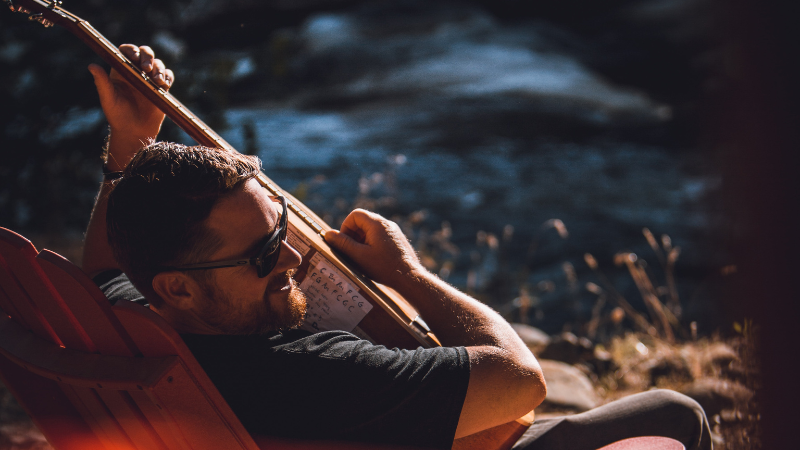
by Francesca | Nov 9, 2023 | Music Industry, Music Production
On top of monetizing your songs through media like TV, advertising, and film, publishers are masters of making sure copyrights, song registration, and general admin are taken care of. Within that general admin comes making sure every detail of each artists’ submitted work is in tip-top shape. While you’re writing your next banger, it helps to keep everything in order as you go to make sure you don’t lose anything along the way. Among those key details, there are 5 main ones to make sure you have saved and ready to go. Let’s dive in…
5 Things You Need To Document For Every Song You Write
Lyrics
These are important to have on deck, as an artist might need them to cut the song or a music supervisor may need them for a film/tv placement down the line. Making sure you have them documented ahead of time saves the stress of locating them later if needed.
Splits
Great songwriting is the basis for some of the biggest hits ever created, and collaboration is one of the best tools to get them there. When it comes to joint songwriting, it’s important to decipher who will get credit for what before the song ever comes out.
Typically, this is done through Split Sheets. A split sheet is an agreement that identifies who wrote what percentage of the song such as the producer(s) and songwriter(s). Each creator has to agree about how the percentages are defined. Some artists will divide it evenly based on who is in the room writing and producing the song. Some will base the percentages on the person’s specific contribution lyrics, hook, melody, and beats.
When it’s time to copyright your music, it’s always a good idea to double check who gets what and how much.
Writer / Publishing Info
Writer and pub information is important for admin purposes when the song is registered. (For example, information like your PRO, IPI#, publishing name, etc.) If this data is broken, the writers don’t get paid and nobody gets the proper credit they deserve.
DOC
This one’s self explanatory, but keeping track of the DOC (aka date of creation) is a popular detail that may come up down the line. Take note!
High-Quality MP3’s
It’s also important to have both an mp3 and a WAV version of your track on file. MP3’s are the most important, but if your song happens to get the opportunity to be placed in movies, TV, etc. (aka sync), a WAV will be required.
In Conclusion…
The takeaway here is to always be prepared for anything. The last thing you want is to be asked for a detail you don’t have and have no idea how to find it. With all these in order, you’re on the right track.
Good luck!
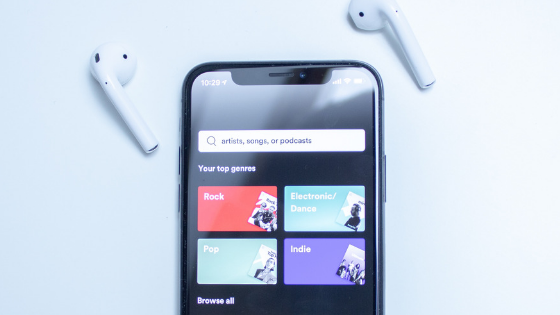
by Francesca | Nov 2, 2023 | Music Industry, Playlists
Spotify offers thousands of playlists meant to fit your every mood. Most of us save these curated playlists for things like going to sleep, working out, doing homework, etc. However, we’re all different. Not everyone falls asleep sleep to lofi beats or gets motivated to kill their workout by Cardi B.
Spotify took note of this, and they’ve implemented a killer solution.
Spotify now offers personalized playlists for each listener based on their particular taste. This means that for those specific playlists, no two will be the same. This applies to some, but not all Spotify editorial playlists, so they’ll be rolling out a blue “Personalized” badge to help signify which ones apply.
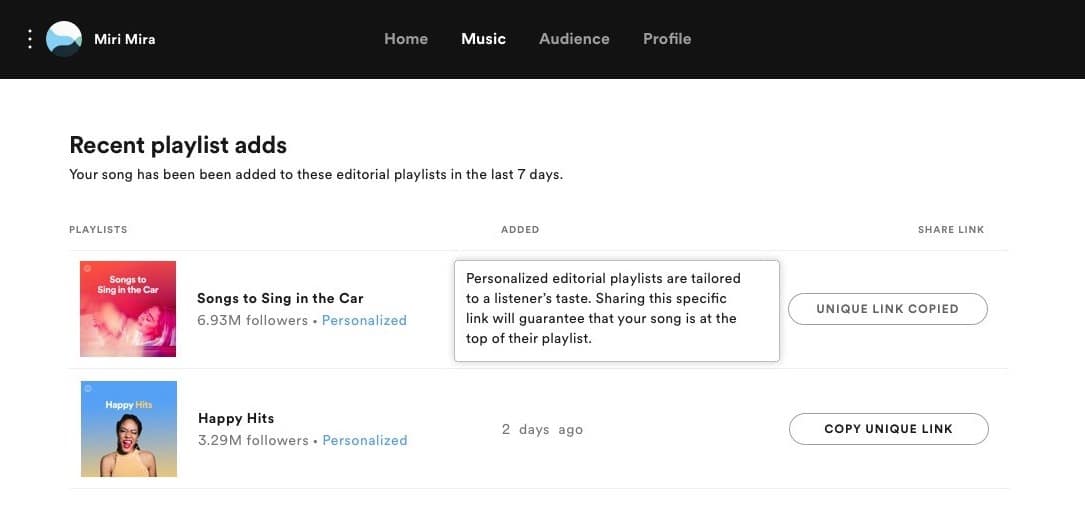
Although this seems like a solution specifically targeted towards users, this is great news for artists as well. Now, your music is in front of the best audience and listened to by just the right people.
Back it up
When Spotify first started testing this new system, they found that listeners were more likely to listen for way longer than before. These personalized editorial playlists increased the number of artists featured on playlists by 30%. The number of songs listeners were discovering increased by 35%. After discovering a song through a personalized editorial playlist, the number of listeners who looked for the track on their own for repeat listens was up by 80%. Additionally, the average number of times a listener saved a track went up 66%. Can’t argue with facts, ya’ll.
The Catch
This all sounds fine and dandy, but Spotify determines these playlists through algorithmic processes based on individual listener habits. This means if your song is on a personalized editorial playlist, it might not appear in every user’s personalized version.
The Solution
Please refrain from smashing your guitar in an annoyed rage, artists. Spotify has rectified this by creating unique links to these playlists for artists to share via Spotify for Artists and Spotify Analytics. Anyone who clicks the unique link will see a personalized version of the playlist with that artist’s track in the #1 spot. There is no longer the need to worry about your followers not being able to find your song among so many others in the playlist.
You’ll find these links on Spotify for Artists seven days after the date when your song dropped into the playlist. When listeners click that link, your song will remain on the top of the list for 24 hours. After this, the track reverts to its initial position or removed from that user’s version of the playlist. When your songs get added to one of these playlists, you’ll receive an email notification, so you can make sure to share the good news with your fans.
Never miss a beat, and optimize how you can get the most out of Spotify by sharing your music with the people who will appreciate it the most.
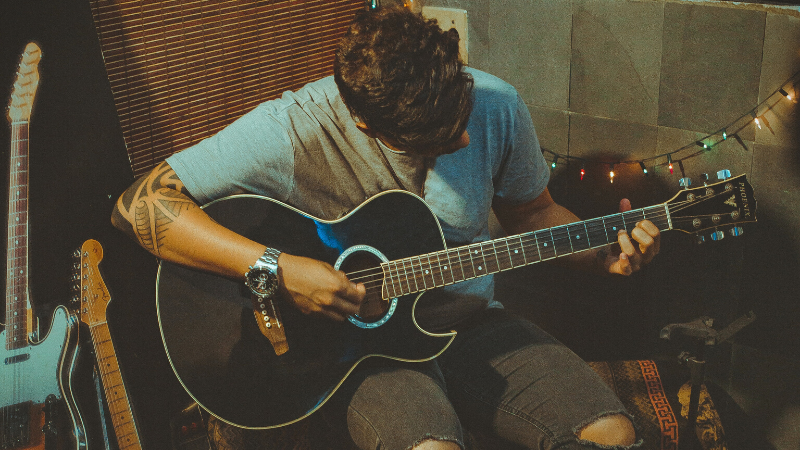
by Francesca | Nov 2, 2023 | Music Industry
In this industry, there’s always more to learn. No matter how big you get, don’t forget the basics! If you feel like you’re stuck in a rut or just want to level up, here are 7 classic methods for growing as an artist and becoming the best you can be. Let’s dive in…
7 Ways To Become a Better Musician
Accept Criticism
The biggest thing that can hold you back as an artist in any field is the inability to accept criticism. Sometimes it can be hard to hear that your biggest passion project is lacking something. Whether it be something major or even the tiniest tweak, it can sting a little for anyone to hear. But even if you disagree, it doesn’t hurt to hear them out. It’s easy to get lost in the process and fall so in love with a project that it’s almost painful to hear anything negative about it, but that being open to that alternative outside view is one of the best ways to create something truly masterful.
Nobody is perfect, and accepting that fact is the ultimate hack to becoming your best self, musically and otherwise.
Practice Every Day
This one’s a no brainer, but I do have a point. When you practice an instrument every day, (whether that’s guitar, drums, music production, or your own voice, etc.) you’re going to see noticeable improvements. The same goes for waking up early, hitting the studio at the same time every day, training your musical ear, writing lyrics, and everything that comes along with being an artist. Having a routine and sticking to it makes everything easier.
Keep in mind… it’s not that the tasks themselves are easier, it’s that you’re getting that much better at them and it’s just easier for YOU to do them. Over time, you’ll look back and be proud of how far you’ve come. Just treat everything you do like a muscle. Nourish it every day, and it will grow stronger.
Learn Music Theory
Music theory is a beautiful language of its own. It gives you the magical understanding of the structure behind every musical composition and helps you speak with other musicians in a common tongue. It’s a common misconception that music theory limits creativity… It’s the total opposite!
Think of it this way, if you’re collaborating with another artist on a new song and they hear a rogue note clashing with part of the vocals, instead of trying to find what note it was for 20 minutes, they can call it out right away and you’ll know exactly what they’re referring to. If the bass is a step too low in one section, it’ll speed up the creative process to know what that means and how to fix it. Not to mention if you plan to collaborate with someone big like Tiësto or Beyoncé, you’re going to feel like a noob by not knowing what a D minor sounds like.
Even teaching yourself the basics will give you a greater understanding of what works and what doesn’t in music and improve the quality of your work exponentially. At the end of the day, knowledge is power.
Set Realistic Goals
When it comes to your music career, your goals need to be realistic and specific. You should be able to quantifiably measure their success as you work towards them, and be able to adjust your process as you go along. Many pros around the world use the S.M.A.R.T method, which breaks down to: Specific, Measurable, Achievable, Realistic, and Timed. (We did a whole post about how to use this method and all it’s benefits right here.)
Let’s face it, many people overestimate what they’ll be able to accomplish in a short amount of time and doing so causes some major (and unnecessary) headaches when things don’t go exactly to plan. That’s why giving yourself a reasonable plan you can actually accomplish without ripping your hair out can make or break your success. — Just be honest with yourself. If you’ve never played a show before, the odds of you booking a world tour in a year may not be in the cards. What could be, however, is to start your first local run of shows in select cities.
Prioritize Mental Health
No matter what stage you’re at in your career, how old you are, or how much you have on your plate, this industry can be overwhelming. With so much on your plate, it’s easy to overlook your mental health and find yourself unsure of how to get back on track. At the end of the day, practicing healthy habits is just as important as sharpening your musical skills. Without a healthy balance, everything can fall apart just as fast as it came.
Collaborate with Other Musicians
Playing with others not only exposes you to different musical perspectives, but also challenges you to adapt to different playing styles. You can start locally with other musicians within your community by reaching out via DM’s on socials, making connections at live events, or just working with your musical friends.
If you want to expand even further, don’t let distance hold you back. Tools like Splice and Vocalizr let you collaborate from the comfort of your own home with artists from all over the world. We also did a whole post right here on some of the best online collaboration tools on the market to help you out.
In Conclusion…
Being a musician is one of the most fun and rewarding jobs in the world. It can also be incredibly stressful with what feels like the weight of the world on your shoulders. As you progress throughout your career, it’s up to you to commit as much time as you can to growing your skills, learning from your experiences, and taking in as much as you can from those around you. With these tips, you’re on your way to becoming the best you can be.
Good luck!
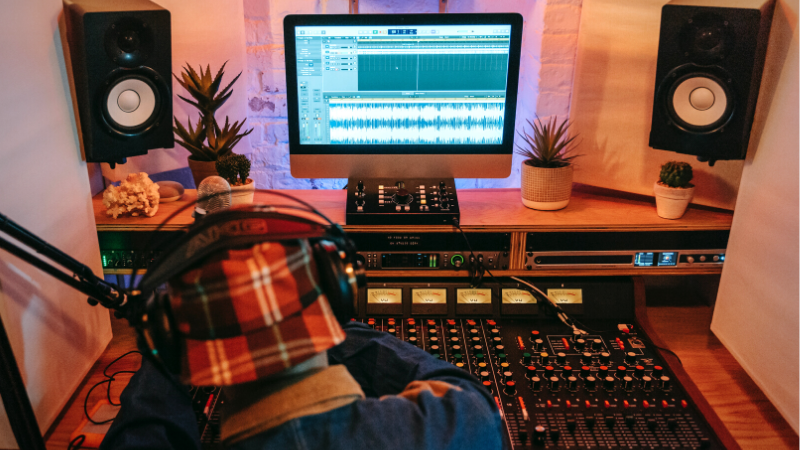
by Francesca | Nov 2, 2023 | Music Industry, Music Production
If you’re a singer, instrumentalist or songwriter, learning how to produce your own music can be an absolute game changer for your artist journey! In this post, Xylo Aria, founder of the online music production learning platform, Music Production for Women (MPW), breaks it down and gives you everything you need to know…
How To Get Into Music Production As A Beginner
I started as a singer songwriter who was always reliant on other producers to make music and I remember feeling quite frustrated as my ideas often got lost in translation. Learning to produce opened up a whole new world of possibilities that allowed me to bring my musical vision to life exactly as I heard it. To help you out on this journey, here’s everything you need to know about taking your first steps into the world of music production.
First, start with what you have.
It can be very tempting to go to a music store, ask for recommendations, and spend lots of money on new gear. Unfortunately, I made this mistake starting out, and 10 years later sold a few things that I ended up never using! There are very few things that you actually need to produce music. These include a laptop, headphones and some sort of production software.
Start with the laptop that you have if it’s powerful enough to produce. You can get a decent quality pair of headphones for around $100, and oftentimes production software companies will offer free trials of their software for you to get started with. If you want to build from there, you can add an audio interface and microphone to record audio and then a pair of studio monitors to listen back on something other than your headphones.
Find a teacher.
This is a point that I wish I realized the importance of earlier! Many people decide to learn on their own from YouTube, and although this can be an accessible place to start, it can easily take five times as long to learn. In addition, not knowing what you don’t know makes it difficult to know what to search for. Getting some lessons or finding a short course, even if it’s just to learn the fundamentals, can drastically cut down the learning curve.
📚 Pro Tip: MPW runs a free Intro to Music Production class you can register for which is an excellent place to start for someone taking their first steps.
Allow yourself to make bad music.
I often see students who are very new to production feel discouraged, because they listen to pop music on the radio and feel their creations don’t sound as good. This is like comparing a toddler taking their first steps to Usain Bolt in a 100 meter sprint. They are two completely incomparable things!
So as you’re learning, set your main goal to enjoy the process rather than to create high quality music. Understand that what you make when you start will likely not sound good, and that’s all part of the process. As you spend more time with it, you will get better!
Be consistent in your learning.
Setting aside an hour twice a week is much better than setting aside a whole day once a month. Producing music involves muscle memory and understanding your tools. Building consistency in your learning will slowly bring you the familiarity you need with the software over time.
Find a community.
Learning to produce on your own can be a lonely journey, especially as a bedroom producer. When the going gets tough, doing it all on your own might even cause you to give up. Finding a community that understands what you’re going through can be a really useful resource. There are great producer communities around the world, for example Ableton has various User Groups in different parts of the world that can be a good place to start. There are otherwise also many other communities online that meet regularly who you can connect with.
In Conclusion…
Starting your production journey is the hardest part, so just take that first step! Whether that’s downloading a free trial of a software or enrolling into a free class to start. I completely understand the frustration of not knowing how things works and wanting to give up, but as you chip away at it one session at a time, you will see your skills develop and evolve. When you get to the point where you’ve created something you love and can pump it up in your car during a summer’s day drive, trust me… it will all be worth it.
//
👀 Want to learn even more?
Claim your FREE music production mini mentoring session with Xylo here. In addition, you can join her mailing list with additional resources right here.
Good luck!







